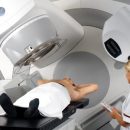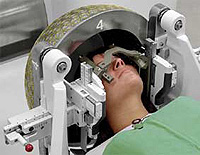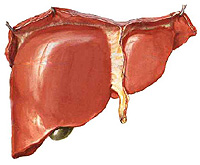Despite the fact that we do not know exactly the reasons for the development of most tumor tumors and the rectum, but still there is the possibility of preventing many cases of such cancer.
Content
 Despite the fact that we do not know exactly the reasons for the development of most tumor tumors and the rectum, but still there is the possibility of preventing many cases of such cancer. When performing screening, it is possible to identify and remove the polyps of colon, which may turn into cancer in the future. Reducing mortality can be achieved by diagnosing tumors in the early stages of the disease, when treatment is highly efficient.
Despite the fact that we do not know exactly the reasons for the development of most tumor tumors and the rectum, but still there is the possibility of preventing many cases of such cancer. When performing screening, it is possible to identify and remove the polyps of colon, which may turn into cancer in the future. Reducing mortality can be achieved by diagnosing tumors in the early stages of the disease, when treatment is highly efficient.
Preventing and early detection of tumors is possible since most cases of colon cancer develop from adenomatous polyps. Polyps are precancerous states of thick and rectum. Their removal can reduce the risk of cancer.
Diet and physical activity
Reduce the risk of developing colorectal cancer is possible due to the impact on factors such as diet and physical activity.
It is important to use a lot of fruits, vegetables, coarse grain products and limit the consumption of high fat products. Recommend at least 30-minute physical activity 5 or more times a week.
If you are moderate or energetic physical activity for 45 minutes 5 or more than a week, then you can even more reduce the risk of breast cancer and colon. In case of overweight, try to lose weight to normal weight and maintain it.
Vitamins and calcium
It is assumed that the daily use of polyvitamins containing folic acid or folate can reduce the risk of colorectal cancer.
It is known that increased consumption of calcium due to additives or low-fat products, also reduces the risk of cancer of this localization. Vitamin D, which we get under the influence of the Sun, as well as in the form of vitamins or with milk, can reduce the risk of colorectal cancer.
Indeed, in zones with a sufficient day of sunny days, the frequency of colorectal cancer below. On the other hand, we do not recommend using intensive solar effects as a measure of the prevention of colorectal cancer, as it can cause skin cancer.
Non-immunity anti-inflammatory drugs
Many studies are shown that people who regularly use aspirin and other non-immunity anti-inflammatory drugs have 40-45% below the risk of colorectal cancer and adenomatous polyps.
However, this information is not final, so these drugs cannot be recommended in order to reduce the risk of colorectal cancer.
Female hormones
 Hormonal replacement therapy in postmenopausal women can slightly reduce the risk of colorectal cancer. Such therapy also reduces the risk of osteoporosis, but can increase the risk of heart disease, blood formation, as well as breast cancer and uterus.
Hormonal replacement therapy in postmenopausal women can slightly reduce the risk of colorectal cancer. Such therapy also reduces the risk of osteoporosis, but can increase the risk of heart disease, blood formation, as well as breast cancer and uterus.
Therefore, the decision to apply hormonal replacement therapy should be solved with the doctor, taking into account the benefit and risk of such treatment.
There are other risk factors that cannot be influenced, for example, family cases of colorectal cancer. However, in this case, it is possible to prevent the disease - take part in screening in young age and make special research more often than those who do not have such a risk factor.
Genetics
Genetic studies can help identify family members with the inherited high risk of colorectal cancer.
People with family adenomatous polypose should make a colonoscopy, starting with adolescence. There are recommendations for the removal of colon aged from 20 to 30 years in order to prevent the development of cancer in it.
Risk of people with inherited non-polisher colon cancer is lower than those with family adenomatous polypose. People with the inherited non-political cancer of the colon is recommended to carry out a colonoscopy from 20 years to identify and remove polyps and detecting cancer in the earliest stages. However, the preventive removal of the colon in people with inherited non-polisher colon cancer is usually not recommended.
Given the fact that some types of colorectal cancer can not be prevented, it is necessary to strive for early diagnosis to improve the forecast of the disease.









